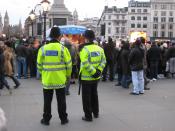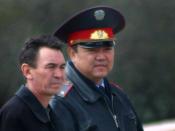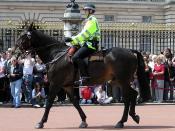TABLE OF CONTENTS
I. Introduction.................................................................................3
II. Political Eras
1) Political Era.............................................................................3
2) Reform Era............................................................................4
3) Community Era.........................................................................8
III. Policing Today..............................................................................9
IV. Bibliography...............................................................................13
Introduction: A Glance into the History
Since the dawn of our country and up to the present time, the schedule of the policing forces was very precise: to support and enforce the law in out community. In order to understand the challenges policing faces today we need to look a bit a its history. Certainly , the way policing bodies operate today had gone through the changes from first forces of police in early America. The enforcement of law had undergone many trends, which still appear now. The enforcement of law can be organized by three main eras of the history. These eras include political era, reform era, and the community era.
Political Era
The political era dates back to the years 1840-1930, that were characterized by five directions: the authority that originated from politicians and law; a broad function of the social service; the decentralized organization; cherished relationships with community, and the widespread use of the foot patrol.
The drawback to the political era was that the police derived the authority from politics and law, and the close connection with politics was considered to be a problem. For instance, in New York, the first police chief was not able to dismiss officers under his command. The term of the chief lasted only year. Subsequently, any early cop of New York, being firmly supported by an alderman and an assistant alderman, could refuse to comply a police superior with a virtual impunity. "So while the British were firing bobbies left and right for things like showing up late for work, wearing disorderly uniforms, and behaving discourteously to citizens, American police were assaulting superior officers, refusing to go on...


